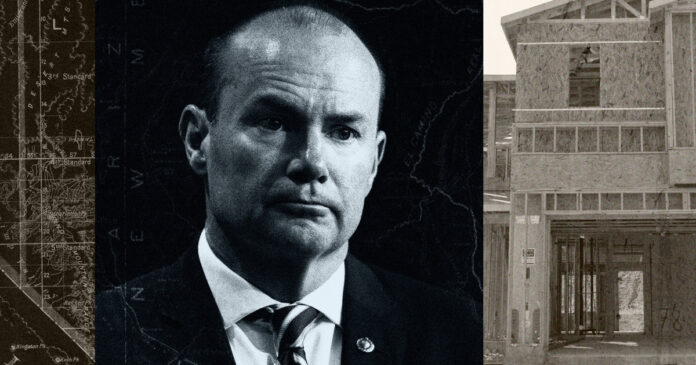"Public Lands Under Siege: The Battle for Affordable Housing and the Future of America’s Open Spaces"
Public Land Sales and Affordable Housing: A Complex Debate
Overview
The ongoing debate surrounding the sale of public lands for affordable housing has gained renewed attention, particularly in the American West. This discussion has been fueled by a combination of rising housing costs, legislative proposals, and public protests. While some lawmakers advocate for the sale of federal land as a solution to the housing crisis, critics argue that such measures could lead to further privatization of public resources without effectively addressing the underlying issues of affordability.
Legislative Background
In June 2023, Senator Mike Lee of Utah proposed an amendment to a major budget bill that would have mandated the sale of up to 3 million acres of public land managed by the U.S. Forest Service and the Bureau of Land Management (BLM). The amendment aimed to generate revenue for tax cuts while framing the sale as a means to alleviate the West’s acute housing shortage. However, the proposal faced significant backlash from various stakeholders, including outdoor recreation groups and local communities, culminating in a protest outside a meeting of the Western Governors’ Association in Santa Fe, New Mexico.
The protest, attended by approximately 2,000 people, highlighted widespread opposition to the idea of selling public lands. Governor Michelle Lujan Grisham of New Mexico acknowledged the crowd’s concerns, emphasizing the importance of public lands for local communities.
The Housing Crisis
The urgency of the housing crisis in the West cannot be overstated. According to the National Low Income Housing Coalition, states like Colorado and Nevada are experiencing severe shortages of affordable rental units. For instance, Nevada is estimated to lack 118,000 rental units for low-income families, exacerbating the housing crisis in cities like Las Vegas and Reno, which are surrounded by public land.
Despite the pressing need for affordable housing, past efforts to sell public land for this purpose have yielded minimal results. A 1998 law in Nevada allows municipalities to purchase federal land at significantly reduced prices for affordable housing projects. However, this mechanism has resulted in the development of only about 850 affordable units on 30 acres of land, while over 17,000 acres have been sold at market rates.
Challenges to Affordable Housing Development
Experts point to several obstacles that hinder the effective use of public land for affordable housing. High land costs, even when sold at discounted rates, can make it difficult for developers to create affordable units. Additionally, bureaucratic processes involving multiple agencies can lead to significant delays in project approvals. For instance, the average review time for BLM projects has recently decreased from three to five years to about one year, but this still poses challenges for timely development.
Moreover, the lack of a clear definition of "affordable housing" in legislative proposals complicates the situation. Critics argue that without stringent guidelines, developers may prioritize high-end housing projects over genuinely affordable options.
Public Sentiment and Future Directions
Public sentiment regarding the sale of federal lands remains largely opposed, particularly among outdoor enthusiasts and local communities who rely on these lands for recreation and livelihood. A survey conducted in Utah revealed that a majority of voters, regardless of political affiliation, support the preservation of national monuments and public lands.
In response to the housing crisis, some states are exploring alternative solutions. For example, Nevada’s recent efforts to sell land for affordable housing at $100 per acre have shown promise, although local authorities have been slow to request these transfers. Additionally, both Democratic senators from Nevada have proposed legislation to open federal acreage for housing while protecting other areas for conservation.
Conclusion
The debate over public land sales for affordable housing is complex, involving a myriad of stakeholders, legislative hurdles, and public sentiments. While the urgency of the housing crisis necessitates innovative solutions, the potential consequences of privatizing public lands must be carefully considered. As states like Nevada and Utah explore various strategies to address housing shortages, the focus may need to shift towards targeted, community-driven approaches that prioritize both affordability and the preservation of public resources.
